#Local halal food
Explore tagged Tumblr posts
Text
Various seafood options are available for Muslims and non-Muslims, but they should always choose the local Halal seafood over other options. It is not just for the faith but for the health as well; some marine animals are toxic to the human body, so they must be avoided. You can choose tuna, salmon, crab, prawns, shrimp, and oysters. Use them to produce the latest culinary dishes famous all over the world.
0 notes
Text

Halal Pastures Farm is a diversified organic farm located in the famous black dirt region of Orange County, NY. Farmers Samer and Diane firmly believe in sustainable agriculture and that soil health is the most important ingredient for producing a healthy crop. We recently chatted with Diane to learn more about their approach towards farming and the certified organic produce, eggs and pastured halal meats they offer.
How did Halal Pastures Farm get started? We started our farm out of a need to provide our growing family with wholesome food. Back in 2011, Samer read an article that Egypt rejected several tons of corn from the USA because it was genetically modified. That was the first time we heard of the word GMO (Genetically Modified Organism). We looked to our own faith to understand what kinds of food we are supposed to be eating. We discovered that, as Muslims, we are supposed to be eating food that isn’t just halal, but also Tayyab – which means wholesome, pure and good. We rejected GMO foods and wanted to feed our family wholesome food. Since we couldn’t find the food we needed to feed our family, we started making it ourselves.

Were you always farmers or did you have other interests and careers before becoming farmers? Diane is a lawyer and Samer is in finance. We are first generation farmers. Diane stopped practicing law to focus on the farm. We also homeschool our children. There is a statistic that 70% of farmers have income from a non-farm source, and we are no exception to that. Our careers helped support the farm and Samer continues to work his other job to sustain it.

As your name implies, Halal Pastures Farm produces halal meats and meat products. What does that mean exactly for those who aren’t familiar with halal? In Islam, halal just means permissible. If something is halal, it means it is permissible to do, consume or use. When it applies to meat, it means that the meat was slaughtered in accordance with Islamic rules.
What are your main flagship products? Our main products are halal meat, vegetables and eggs.

Do all your shoppers follow halal? Or do you have non-halal shoppers? Everyone shops from us [including people who are not following halal]. The common theme amongst everyone who buys from us is that they really appreciate good food made with intention.
Halal Pastures Farm is a diversified farm which means you grow a variety of crops and animals on a single farm. What are the advantages and disadvantages of this approach to farming? In terms of geography, our farm is spread out across Orange County. The crops that we don’t sell or are spoiled are saved and given to the chickens to eat. And we are experimenting this year with using the manure from our chickens as fertilizer for the soil in which we grow our crops. We also work with farmers throughout upstate NY who raise the animals organically and in accordance with their life cycle.

Halal Pastures Farm grows a lot of different types of fresh produce. How many different varieties of fruits and vegetables do you currently grow? We are currently growing around 600 varieties of vegetables and fruits. We try to grow varieties that are unique and different to what you would find in a supermarket. For instance, [this past summer] we grew a yellow pointy tomatillo called Chupon de Malinalco1. We grew an eggplant called Rosa Bianca2 and a tomato called Orange Strawberry3. We also grew a fruit called the husk cherry4 that people just loved. 1Chupon de Malinalco is an heirloom Mexican tomatillo that grows up to four inches long. It’s lemon yellow in color with a cone, slightly heart-shape and tapered tip. It tastes sweet and fruity with a slightly tart taste. It’s great for making salsas and can be enjoyed fresh. 2Rosa Bianca is an Italian heirloom variety of eggplant noted for being particularly creamy and tender. 3Orange Strawberry is a German heirloom tomato variety that produces large, bright orange fruit shaped like strawberries or oxhearts with a meaty flesh and sweet, rich flavor. 4A husk cherry, also known as a ground cherry, is a small, sweet fruit that grows in a papery husk. They are related to tomatoes and tomatillos. Their exotic, mild flavor has been compared to a cross between tomato, mango and pineapple.
You have an extensive network of greenhouses that allow you to grow through the colder months. Are your greenhouses heated or unheated or both? We have both heated and unheated greenhouses in which we are currently growing winter greens and spring greens including kale, chards, mustards and spinach. We overwinter our greens because it concentrates the minerals in the vegetables and makes them taste sweeter.

Halal Pastures Farm is a certified organic farm. Does this refer to all your products? Our produce and eggs are certified organic. Our meats are certified organic and/or 100% grass-fed and grass finished.
What are some of Halal Pastures Farm's newest products and value-added products? We have many new products that have come down the pike. We have introduced organic halal chicken bone broth, smoked organic chicken breast (its nitrate and nitrite free), tomato sauce, jams (strawberry, rhubarb, and ground cherry ginger flavors), pickles, tomatillo salsa, harissa, garden pickles and pickled beans.

What are some of your best-selling products? Thankfully, all our products do well. The eggs are a top seller right now.

What are some of Halal Pastures Farm’s plans for the future? We hope to one day purchase land that is large enough to house our full farming operation.
Is there anything else you’d like our shoppers to know about Halal Pastures Farm? We work really hard, love what we do and take our work seriously. We are loyal to our customers and hope to always produce food that is wholesome and good for them.
Thank you, Diane, for taking the time to talk with us and sharing more about your farming philosophy and operations. Find Halal Pastures Farm and their wide range of certified organic products and halal meats on Sundays year-round at our Park Slope Farmers Market and during the summer season at our Cunningham Park Farmers Market.
#farmersmarket#downtoearthmkts#shoplocal#eatlocal#farmersmarkets#localfood#eatdowntoearth#local food#agriculture#buylocal#halal meat#halal food
0 notes
Text
#Local halal restaurants#Halal dining near me#Nearby halal eateries#Local halal cuisine#Halal food options nearby#Halal restaurant listings in my area#Muslim-friendly restaurants nearby#Halal meals near me#Halal dishes in my locality#Local halal restaurant directory#Halal restaurant reviews nearby#Islamic dietary guidelines in my area#Halal menu options locally#Nearby halal dining spots#Local halal restaurant finder
0 notes
Text
https://makanmate.com/catering-menu/vegen-vegetarian-catering/
#Singapore Catering#Local Catering Services#Delicious Food Catering#Gourmet Catering Singapore#Halal Catering Singapore#Buffet Catering#Best Caterers in Singapore
0 notes
Text

[ID: A greyish brown stew presented alongside flatbread, red pepper paste, green peppers, and carrot sticks. End ID]
سماقية / Summagiyya (Gazan stew with chard, chickpea, sumac, and 'lamb')
Summagiyya (سُمَّاقِيَّة; also translitered "sumagiyya", "sumaghiyyeh" or "sumaqiyya") is one of the signature dishes of the Gaza strip, in particular Gaza City. It consists of lamb, chard, and chickpeas in a sumac-infused broth; savor and zest is added by a dagga of dill seeds, garlic, and peppers, and nutty depth by a generous drizzle of red tahina. The resulting stew is thick, earthy, and slodgily grey (due to the green chard and red sumac)—it also has the characteristic sourness of much Gazan cuisine.
Summagiyya is most often prepared during holidays, especially Eid al-Fitr; it's an excellent make-ahead dish for these occasions, since it's even better once its flavors have had time to meld and mellow overnight. It is served cold alongside fresh vegetables, and eaten by using flatbread to scoop up each bite. This recipe provides a spiced seitan recipe to replace the lamb, but you may also use any lamb or beef substitute of your choice.
Today, summagiyya is often prepared with Israeli white tahina, as decades of punitive import laws, taxes, and restrictions have enforced Palestine's status as a consumer, rather than an producer, of food products. Israeli tariffs on, and confiscations of, Palestinian goods have forced those tahina factories that survived to import sesame seeds rather than using locally grown crops, even as they export the best of their product to Israel. The dubbing of foods such as tahina and hummus as culturally "Israeli" cuisine works to hide this exploitative relationship, and cement an Israeli national identity through the subsuming and erasure of Palestinian existence. It is for this reason that Emad Moussa writes that Palestinian cuisine has a role in "protecting against a people's very extinction."
Medical Aid for Palestinians (MAP) has put out an urgent call for donations to provide medical supplies to Palestinian hospitals when supply lines reopen. Also contact your representatives in the USA, UK, and Canada.
Ingredients:
For the soup:
500g (2 large bunches) chard (شلق), diced
80g Levantine sumac berries (Rhus coriaria)
1/2 cup soaked and boiled chickpeas, mostly cooked (40g dry / scant 1/4 cup)
1/4 cup red tahina
1/2 cup (60g) all-purpose flour
1 large yellow onion
1/4 cup olive oil
1 tsp kosher salt
2 cardamom pods (optional)
2 allspice berries (optional)
More olive oil, to fry
Sumac berries can be found in the spice section of a halal grocery store. If you're unable to locate whole berries, pre-ground will do.
For the dagga:
1 1/2 Tbsp dill seeds
5 cloves garlic
1/2 green cubanelle pepper
2-3 dried red chilis (optional)
1/2 tsp black pepper
1/4 tsp cumin
Dill seeds may be found at a halal, south Asian, or speciality European grocery store. They are commonly used in Indian food and as a pickling spice. At a south Asian grocery store they may be labelled soyo, suva, shepu, or savaa.
For the lamb:
1 cup (120g) vital wheat gluten, aka gluten flour
1/2 Tbsp ground sumac
1/2 tsp ground caraway
1 tsp onion powder
1 tsp Palestinian 7-spice
1/2 tsp garlic powder
1/2 tsp sea salt
1/2 tsp ground black pepper
1/2 tsp ground cumin
1/2 tsp ground aniseed
1/2 tsp turnermic
1 tbsp olive oil
1/2 tsp soy sauce
1 tsp miso paste
2 cloves garlic, grated
2 tsp pomegranate molasses
1 Tbsp white or red tahina
About 1/2 cup vegetarian 'beef' stock from concentrate, or vegetable stock
Pomegranate molasses is simply pomegranate juice that has been reduced to a thick consistency. It may be found in the sauces section of a halal grocery store.
Instructions:
For the soup:
1. Soak dried chickpeas in cool water overnight, or in just-boiled water for an hour. Drain and re-cover with water, and boil for 30-45 minutes, until almost fully cooked. Drain and set aside.
2. Simmer sumac seeds in enough water to cover by a couple inches for about an hour, until the water is dark red. Blend the seeds and water together, then strain the mixture through a cheesecloth.
If you're using ground sumac, skip the blending step. Use a cheesecloth or very fine metal sieve (such as one intended for brewing tea) to remove the ground spice from the water.
3. Whisk the flour into the sumac-infused water.
For the lamb:
1. Combine all dry ingredients in a large mixing bowl. Add wet ingredients other than stock and stir briefly. Add enough stock to produce a soft, smooth dough.
2. Knead by hand on a clean surface, or put in a stand mixer with paddle attachment on medium-low, for about 5 minutes. You should see stringy strands begin to form in the dough.
3. Allow to rest, covered, for 5-10 minutes to encourage gluten formation. Knead for another 3 minutes. Do not over-knead.
4. Tear the dough into bite-sized pieces.
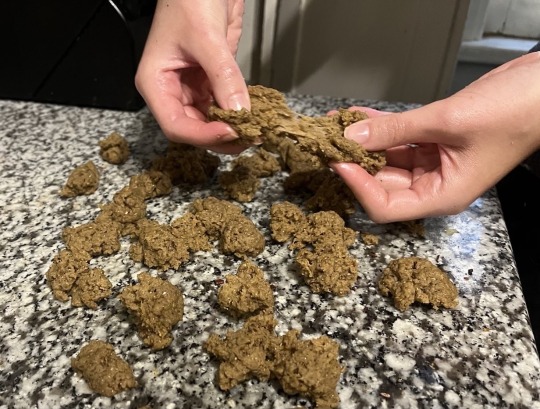
Stringy seitan being pulled apart into pieces.
You may also shape the dough into a slab and cube it with a sharp knife—the lamb or beef used in summagiyya is usually cubed—but I prefer the texture of torn seitan to sliced.
5. Steam the seitan pieces for 10 minutes in a bamboo steamer or using a metal steamer basket. Place the bamboo steamer in the bottom of a wok and cover its base by about 1/2" (1 cm), then raise the heat to boil the water; lower the heat to keep the water at a simmer. If using a steamer basket, place it over the opening of a pot containing a couple inches of water and bring it to a simmer. Start the timer when the water begins simmering.
6. Heat olive oil on medium-high and sear the steamed seitan pieces, turning as necessary, until deeply browned on all sides. Set aside.
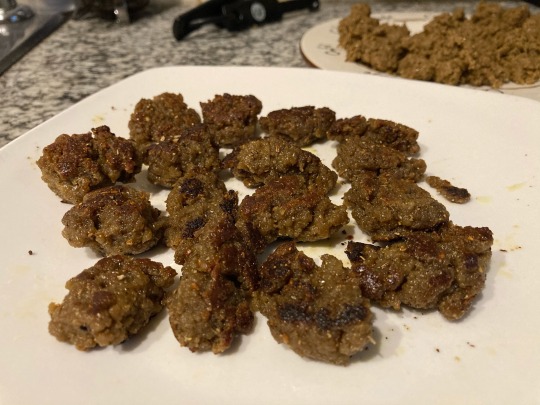
Fried seitan pieces.
You can save a step here by searing the raw seitan, then returning it to the pot after you've fried the onions to simmer it rather than steaming. I found that this produced a mushier texture.
For the dagga (دقة):
1. Grind cumin and black pepper thoroughly in a mortar and pestle, then add dried red pepper and dill seed and crush coarsely. Add green sweet pepper and garlic and pound until a coarse mixture forms.
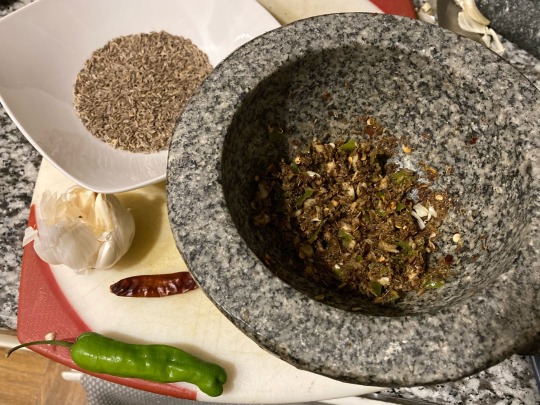
Dill seeds, green sweet pepper, garlic, and dried red chili on a cutting board, alongside dagga in a large granite mortar.
You may also use a spice mill or food processor.
To assemble:
1. Chop the onion. Wash the chard and slice it thinly in one direction; turn it ninety degrees and slice thinly again.
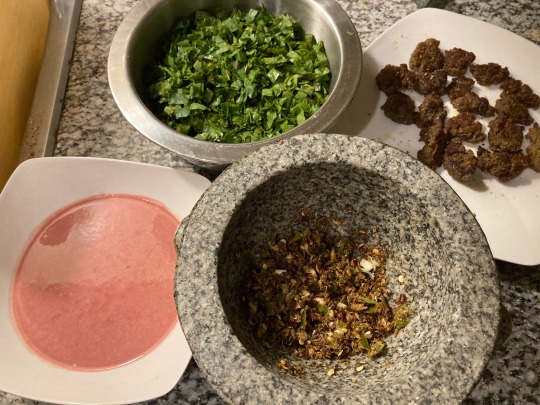
Diced chard, fried seitan, dagga, and sumac-infused water with flour.
2. In a large pot, heat a couple tablespoons of olive oil on medium. Fry chopped onion, cardamom pods, and allspice berries for a minute until fragrant. Add half of the dagga and fry until fragrant.
3. Add chard and fry, mixing often, until wilted.
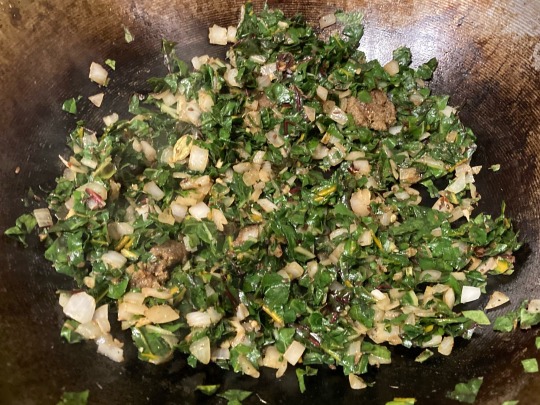
Wilted chard in a wok.
4. Add sumac mixture, chickpeas, and water to cover. Bring to a boil, then lower heat to a simmer. If you didn't steam your seitan earlier, add it now.
5. Continue to stir and simmer until the stew is thick, homogenous, and greyish-brown, about 15 minutes.
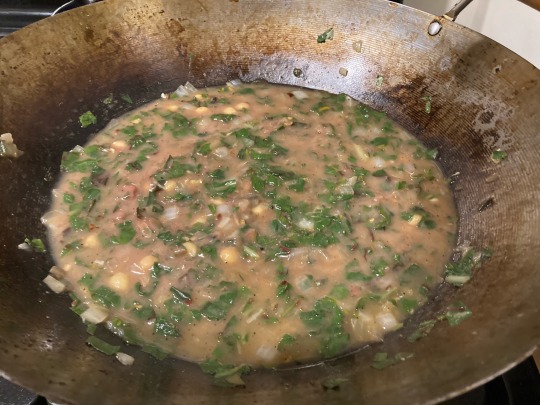
Simmered stew.
6. Add the remainder of the garlic mixture, the red tahina, a pinch of ground cumin, the 1/4 cup olive oil, and salt to taste. Return the steamed and seared seitan to the pot and mix.
Serve cool with flatbread, sweet green peppers, bitter green and black olives, carrots, leafy greens, and/or pickles.
#vegetarian recipes#vegan recipe#vegan cooking#Palestinian#Gazan#chickpeas#lamb#seitan#chard#dill seeds#pomegranate molasses
499 notes
·
View notes
Note
well since you've got me thinkin' of the bats again,
what do you think their Oh Shit moment would be? Like that single moment where they realise This Is It? Cuz I can't stop thinking about it. Like imagine just sitting in the living room with Jason on a lazy day and you turn and he's kinda just staring at you with this lovesick look and you ask whats up and he just shakes his head and looks away smiling like an idiot cuz ah shit, this is the life he wants.
Or or or you're out grocery shopping or smth with Bruce and it kinda hits him somewhere through the point of entering the store and picking up 5 different cereal boxes that he genuinely wants this forever and ever
and ahhhhh like this could go so angsty but also so sweet?
ANYWAY I REALLY LIKE YOUR WRITING IT MAKES ME HAPPY
<3
Ok ok I thought about this the entire drive home!!!!
Bruce - the two of you are visiting an orphanage that’s Wayne Enterprises is interested in funding (in reality, he’s investigating them for embezzling funds and child abuse). You came as Wayne’s dazzling arm piece to draw more press, but he knew you were much more than tabloid fodder. You couldn’t care less about listening to the director drone on and on about how much he was doing (read: not doing) and when a small hand tugs on the hem of your pants, you immediately kneel on the dirt stained floor and give the child your full, undivided attention. You nod along, ask questions, and make the child feel as though they’re special. You show them that someone cares. Bruce watches this with his heart pounding in his chest. He remembers a time when a young orphan was ignored by the world unless they were able to manipulate him and use him for their own agenda, to make themselves look good. He realizes with a jolt that you see him. You see the orphan boy in the alley, the broken man in the cape, and the actor in his suit. You see all of him and you give him your whole attention. Oh.
Dick - For you, it’s just an offhanded comment made as the two of you walk through the crowded streets of Bludhaven. “There’s a halal market on the next street. Can we stop and grab Damian some gulab jamun and namoura? He’s been stressing over his grades recently and I know it’s not much, but hopefully it’ll cheer him up.” A bolt of warmth strikes through his chest as he realizes that you’ve memorized Damian’s favorite desserts. You researched halal foods and the local markets. You checked in on Damian, listened to his frustrations, and read his tells better than anyone. He recalls how you’ve made these passing remarks about all of his siblings. How long have you taken care of them in this subtle, gentle way of yours? He laces his fingers with yours, lays a kiss to your temple, and lets you lead the way to the market.
Jason - The sun that slips through the linen curtains Alfred hung up one day bathes Jason in a delicate glow. He reclines on the couch, your head on his chest and legs tangled together, with a book in his hand. You’re half asleep but he whispers the words he reads regardless. How long has it been since he felt this relaxed? Your soft breaths release in little puffs that tickle the skin of his wrist, but he refuses to move. He doesn’t want to wake you up. He wants to lay in this position for the rest of his life. He wants to be with you for the rest of time, until the scythe of death comes calling for him once more, and he places himself between you and the Grim Reaper.
#jason todd x reader#jason todd imagine#dick grayson x reader#dick grayson imagine#bruce wayne x reader#bruce wayne imagine
695 notes
·
View notes
Text
I think it'd be fun to sort of liveblog looking for countries that haven't abused/exiled Jews
I haven't found a list. So I'm making one.
Let's start with China. China has Jewish communities, and maybe not enough of them to become a target! The perfect amount?
Wow, Jews have lived in China since the 7th century CE. I've heard of the Kaifeng Jews!
Oh, this is ominous: "In the first half of the 20th century, thousands of Jewish refugees escaping from pogroms in the Russian Empire arrived in China. By the time of the establishment of the People's Republic of China in 1949, only a few Jews were known to have maintained the practice of their religion and culture."
Wow, fun fact:
According to an oral tradition dictated by Xu Xin, Director of the Centre for Judaic Studies at Nanjing University, in his book Legends of the Chinese Jews of Kaifeng, the Kaifeng Jews called Judaism Yīcìlèyè jiào (一賜樂業教), lit. the religion of Israel. Yīcìlèyè is a transliteration and partial translation of "Israel".
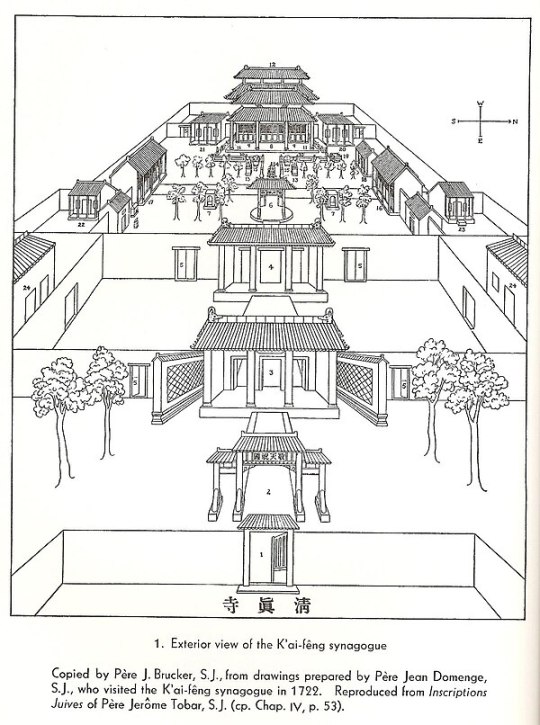
Surprising and cool:
Famous Venetian traveler Marco Polo, who visited China, then under the Yuan dynasty, in the late 13th century, described the prominence of Jewish traders in Beijing.
Neither surprising nor cool:
Genghis Khan called both Jews and Muslims Huihui when he forbade Jews and Muslims from practicing kosher and halal preparation of their food, calling both of them "slaves" and forcing them to eat Mongol food, and banned them from practicing circumcision.
In the late 1800s a lot of Jews emigrated from India and Iraq to China; they "took a considerable part in developing trade in China, and several served on the municipal councils."
In the early 1900s, 20,000 Jewish refugees from Russian pogroms emigrated to Harbin, in northeast China and "and played a key role in the shaping of local politics, economy and international trade."
Surprisingly:
Dr. Sun Yat-sen, founder of the Republic of China, admired the Jewish people and Zionism, and he also saw parallels between the persecution of Jews and the domination of China by the Western powers. He stated, "Though their country was destroyed, the Jewish nation has existed to this day ... [Zionism] is one of the greatest movements of the present time. All lovers of democracy cannot help but support wholeheartedly and welcome with enthusiasm the movement to restore your wonderful and historic nation, which has contributed so much to the civilization of the world and which rightfully deserve [sic] an honorable place in the family of nations."
Wow. It really doesn't go into any more detail about the SMALL gap between "40,000 Jews moved to China from 1845-1945," and "most of these Jews emigrated to Israel or the West... by the time of the establishment of the People's Republic of China in 1949, only a few Jews were known to have maintained the practice of their religion and culture."
That's four years.
Let's look at other sources.
At first, life in Shanghai was peaceful for its newest residents. The Jewish refugees were welcomed by Shanghai residents and they created a strong community with schools and a vibrant social scene. Some refugees began working as dentists and doctors, while others set up shops, cafes and clubs in the neighbourhood.
What the refugees couldn't foresee was they would travel across the globe only to fall into the clutches of the Nazis' most powerful ally. In 1941, Japan seized Shanghai. Acting under instruction from the Nazis, Japanese troops rounded up all of the city's Jews and confined them in Tilanqiao. Shanghai's Jewish ghetto had been born....
According to [historian Dvir] Bar-Gal, even prior to the Japanese invasion, many Jewish refugees in Tilanqiao lived in poverty compared to their comfortable lifestyles back in Europe. Conditions worsened greatly after Japanese soldiers gathered Jews from across Shanghai and forced them to all live within the borders of this newly formed ghetto. Jews were banned from leaving the area, even for work, unless they received permission from Japanese officers, which rarely happened.
Disease and malnutrition plagued the many heinously overcrowded group homes. "It went from a poor neighbourhood to an extremely poor neighbourhood," Bar-Gal said. "Many people had no jobs and lived in communal housing with many other beds and common bathrooms and kitchens. They had zero privacy and almost no food."
Yet, while six million Jews were murdered during the Holocaust, and up to 14 million Chinese soldiers and civilians were killed during their nation's war with Japan from 1937 to 1945, the majority of Shanghai's Jewish refugees survived. This remarkable feat was described by Holocaust historian David Kranzler as the "Miracle of Shanghai", and according to Bar-Gal, they survived because Jews weren't a primary target of the Japanese forces.
In 1945, when World War Two ended with the defeat of Japan and Nazi Germany, Japanese troops retreated and most of Shanghai's Jews quickly left, relocating to places like the US, Australia and Canada. But had Shanghai not taken these refugees in, many of these more-than-20,000 Jews may have never survived the Nazi death squads....
The first structure I came across was the imposing old Tilanqiao Prison. During World War Two, the Japanese incarcerated dozens of Jewish refugees and Chinese dissidents behind its thick stone walls. The brutality of the Japanese gave the Jews and the Chinese a common enemy and a shared experience. This connection remains strong, according to Tian.
That still leaves at least another 20,000, though? (I would say almost 20,000, but for the ones who already lived in China.)
Hmm. Here's a paper that says Jews "not only took part in the revolution but had also helped igniting it and then stayed on or joined later. While dealing with this puzzle in my paper, I’ll try to offer a typology of Jewish activists and revolutionaries in China, to explain their motives (by choice or not), and to evaluate their contributions in perspective. It appears that their Jewish identity did not play a direct role in their revolutionary activism, but it did play an indirect role. Included in this study are Grigorii Gershuni, Grigorii Voitinski, Boris Shumiatsky, Michail Borodin, Adolf Joffe, Pavel Mif, David Crook, Sidney Rittenberg, Israel Epstein, Sidney Shapiro, Solomon Adler, Sam Ginsbourg, Michael Shapiro, and more. Their main value to the revolution was mainly writing, translation, communication and publication. Although they were all deeply committed to the Chinese Communist revolution, some of them were jailed – for years – and occasionally more than once. Nonetheless, they continued to believe in, and even to justify, the Chinese Communist Party."
Wait, waaaaait. I was about to try to find the full paper (titled "Combining contradictions: Jewish contributions to the Chinese revolution"), but I ran across this first:
A century ago, the Communist International and the then-Russian Communist Party dispatched several agents to help foment revolution in China, including Russians like Grigori Voitinsky and Vladimir Neiman-Nikolsky and the Dutch Communist Henk Sneevliet. In addition to their shared commitment to Communism, all three were of Jewish heritage.
O rly??
They came with SKILLS!
On the evening of July 30, less than a month after the founding of the Communist Party of China (CPC), members of the CPC’s First National Congress met for a vote on a new party program. Suddenly, an unfamiliar middle-aged man barged into the meeting hall. “Sorry, I’m in the wrong place,” the man declared before hurrying off.
Sneevliet, well-versed in the techniques used by the police around the world to crack down on revolutionary activities, suggested that the meeting be adjourned and urged members to leave. By the time police arrived 10 minutes later, the building was already cleared out.
If you think that's impressive, try this!
Richard Frey... was an Austrian Jew who fled to Shanghai in the late 1930s. He worked for a hospital in the city until 1941, when he moved to a Communist military base in North China to teach medicine. In 1944, Frey was transferred to the central Communist base in Yan’an in China’s northwest Shaanxi province, where he soon succeeded in producing a crude but much-needed form of penicillin.
He just. Made up his own penicillin for them.
What the entire fuck.
HERE we go!
International Journal of China Studies, December 2020. "Combining Contradictions: Jewish Contributions to the Chinese Revolution," by Yitzhak Shichor, University of Haifa and Hebrew University of Jerusalem.
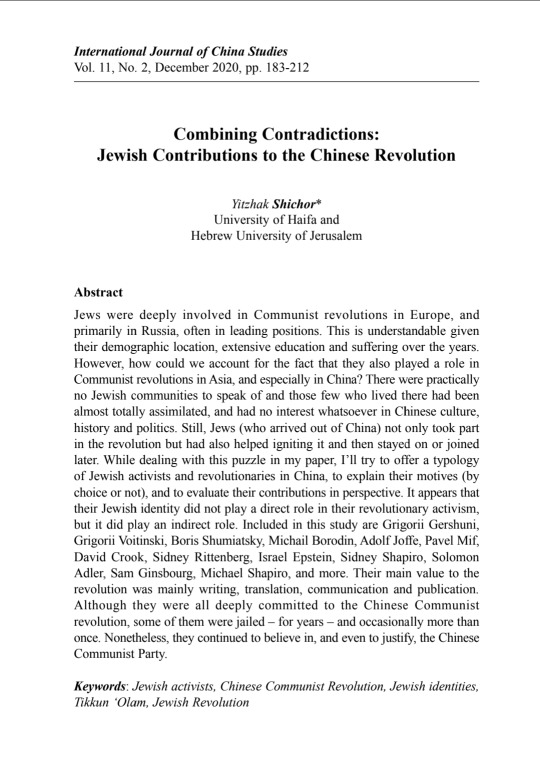
Fun Fact:
Jewish Lithuanian activist Grigory Gershuni emigrated from Russia to China by hiding in a barrel of sauerkraut.
Yeah okay, I think China's number one on the list of Hey, Some Countries Didn't Try That!
Next time: Japan? Or Brazil? Hmmmm.
32 notes
·
View notes
Note
https://olderthannetfic.tumblr.com/post/741872748055396352/as-someone-who-loves-to-cook-very-international-a#notes
One thing I completely forgot to mention. For anyone who eats meat: A GOOD BUTCHER! Too many people really need to find a good butcher, because more than half the "bland" meat based dishes will remedy themselves if you find a good butcher. Especially if you manage to build a line of communication to get cuts of meat as fresh as possible, you'll get fresh and well tasting meat. There's a world of difference between a good butcher's cut piece of meat, and most of what you might find in a supermarket. You know how chicken is considered some of the driest and least flavourful meat? If you get a good butcher who knows some chicken farmers, you might actually be able to get some actual fat and flavourful chicken that gets to eat grass and whatever it can find outside, instead of the mass production farm chicken that get feed with pellets. So much can impact the flavour of meat. You'll also feel much more satisfied eating meat only a few times a week if those cuts actually taste good and filling, which can cut down on your meat consumption, obviously also paired with fresh and flavourful veggies and other sides. And so we don't forget it, same goes for a seafood market. Especially seafood honestly. Some seafood really only tastes good "out of the water, into the pan, onto your plate." If it takes too long, you'll end up with less than stellar tasting meat. You also get fish and seafood that way that hasn't been processed with chemicals and other additives to keep it fresh longer. Flash frozen is also a valid form to get fresh unprocessed fish, so don't be afraid if you hear the fish you're buying was flash frozen. And for vegetables and fruit: A good farmer's market, or at least a list of in-season veggies and fruits. Veggies and fruit will always taste best within their harvesting season. A farmer's market will often have more focus on flavour and actual aroma, rather than how supermarkets some times mostly focus on the looks of the produce. Some vegetables and fruits that you get at the supermarket might be watery and bland, or even dry/woody and stringy, while the farmer's market, mainly/especially for local produce will be a lot more flavourful and aromatic. Having the option to use veggies that actually taste like something really does a world of difference for your diet!
--
There's a place in the Bay Area where you can go select your chicken or duck and wait for them to slaughter it. Depressing, maybe, to have to look your dinner in the face before it's killed, but one meets an interesting cross-section of Chinese immigrants, people who want halal food, etc. Last time I was there, a little old lady told me I needed to make chicken soup immediately on returning home and not refrigerate the chicken, wait, or try to do dishes like roast chicken that require more fat because these particular chickens are too lean.
She said most people have never tasted a proper dish made from freshly killed chicken, at least around here.
46 notes
·
View notes
Text
once again another "i've never been sponsored by anyone in my life but i'm autistic and feel compelled to share when i've enjoyed something" post. i've gotten these as groceries multiple times



the buldak i eat with a lot of milk (3/4 cup), some butter (1 patty), some shredded mozzarella (vibes), and some imitation crab (~2.5 oz, or 1/3 of an 8 oz bag of flake style) i shred with a fork and knife. all of the powder. most of, but not all of the hot sauce packet. microwave to ensure the cheese melts. top with black pepper. i've also eaten them as-is (albeit with a little too much water) and the spice level was too high for me, but it's basically a spicy alfredo with a hint of indistinguishable umami meat-flavor. the spice overpowers the flavors, in my opinion. so bringing them out with real milk, real cheese, "real" meat, really elevates it. (and also because i didn't realize this the first time because the english instructions are unclear: this is a pasta. you cook the noodles alone and then strain all the water out before you add sauces and such.) also also. "cream carbonara" is different from "carbonara." i specifically get the cream one because it is milder.
the classic samyang i use about 1.5 tablespoons of the soup base, all of the toppings. i do egg-drop ribbons. and then sometimes i'll toss other stuff in depending on what's in my fridge. maybe some chicken or meatballs or lunch meat. edamame i feel is too firm but maybe a softer legume or vegetable. the more stuff you add, the less spicy it will be, so i'll add more soup base if i think it's too bland. the flavor of the soup is like... smoked ham? but it's actually halal. and it's spicy as well.
the milk toast i typically slice into four pieces, and put all four in the toaster (even the "end" pieces) for a VERY short time (because they burn easily). and top with either a fruit jam or butter + honey + schechuan pepper. you can also eat the cube as-is by pulling pieces off and eating them as you would a baguette. it's a sweetened bread so it's not really meant for savory things like sandwiches. and it's shelf-stable for several weeks at least, although it starts to go stale over time. the bags each contain four cubes that are like... 3 x 3 x 3 inches i think? the slices just barely fit in my toaster
the UCC brand of melon soda i used to drink a lot when i was a kid but i can't find it anywhere around here anymore. it makes for a nice treat every once in a while. very refreshing. the mango flavor is good too but not as much as the melon
the salted-vanilla pocky is seasonal (for summer) so i'm going to be sad when it's gone. but it's a really interesting flavor contrast. it reminds me of "milk pocky" (which i've also been unable to track down for years) and it's also sort of pretzel-like with the salt coating. really good
the marshmallows, if i'm not careful, get devoured in one sitting. they're loose in the bag, not individually wrapped like other marshmallow candies i've had before. and they're also smaller in size. the mango jelly is really good
i haven't tried a lot of japanese chocolate but i was impressed by how creamy this lotte bar was. i'm also a sucker for strawberry-flavored chocolate in general. i'm curious to see what their milk chocolate is like
and, again, not sponsored. no code. nothing. but i get my asian groceries through Yami, which i find is cheaper than amazon. i click the "fulfilled by yami" box so everything ships at the same time and it's coming from california, rather than overseas. i haven't had any issues with them so far. but if you actually have access to these groceries in your area, support local asian grocers rather than buying online. i live in a food desert, so this isn't possible for me unless i drive quite a distance, and even then, there are not many options
9 notes
·
View notes
Text
911 Lone Star: 126 & Culture
Hi, this post has been in the works for... a while. I got about halfway through it, got sick, and then looked it back over and scrapped the entire thing to restart because I couldn't find my train of thought again. It happens, and unfortunately it caused this to take far longer than I would have ever liked for it to.
And seeing as the LS section of the 911 fandom isn't usually rabid, I don't feel as much need to issue the typical "hey if it looks like I'm hating on a character, I'm not, I've got source material for any criticism of a character" thing, but this particular post does come with the additional comment of: this is discussing culture. As such, I've tried to do my research and approach the topics with care, but if I misrepresent something, I would love corrections - just please be respectful when offering them. I'm always happy to learn about other cultures.
As an additional note, to any who celebrate: Ramadan Mabarak!
Without further ado, onto the content.
First and foremost, I'd like to pay mention to the original culture of the 126 pre-Owen. It's a firehouse in Austin, Texas. It's steeped in your standard Southern Culture. This is a culture I'm very familiar with, as someone who's spent their entire life in the deep south. Judd and how he and Grace approach things will absolutely be the reference points I make for those unfamiliar with the culture, as they're the ones representing that within the 126 community and extended families.
Judd and Grace are deeply religious (yes, Judd has his hangups and he's lost his faith a time or two, but it happens), but they're religious in the way Christians are truly meant to be. They don't force their beliefs on others for all that I guarantee you they have a prayer list. They're absolutely church on Sunday, sunrise service on Easter, community outreach programs and all.
Grace approaches things in the way of "may I pray for / with you" when things get hard. Her faith is a foundational pillar and a relatively unshakable one at that. She's also the one that taught those in the 126 that weren't from the South just how diverse a meaning "bless your heart" has. She's also the leading figure of "there's nothing scarier than an angry southern lady".
Judd, on the other hand, doesn't lean religious due to his own personal relationship with it. He's the side of Southern Culture that's all acts of service to be neighborly, remembers everyone's names that he can. He's the guy you call when you get stuck on a backroad somewhere and need a lift, or if you need a hand setting something up.
I also believe that Judd's particular brand of Southern Hospitality extended to him looking into the cultures being brought in with the new members of the 126 so that he could start learning and support his new family members - don't tell me that man didn't ask Marjan if she wanted the rest of them to fast alongside her during Ramadan the second he learned it was a thing. I'll call you a liar.
I also believe he was the one that put the time and effort into ensuring the firehouse only ever shopped local or at halal markets. Man's got a list in his phone that he double and triple checked to make sure they never brought anything into that firehouse that someone couldn't eat. They all eat the same thing when they cook, he's made sure of it.
Additionally, Carlos' close proximity to the 126 means he also brings in the mix of Southern and Mexican heritage. Food is a love language to him, and he absolutely brings meals in on the hard shifts when he isn't also working.
TK being jewish on his mother's side also brings in some interesting dynamics. While canon suggests he doesn't actively observe that part of his culture aside from a few small nods, I do fully believe he rarely breaks the habit of eating kosher. No pork is allowed at the firehouse due to this (a loss that Judd certainly mourned). But he doesn't bring in a lot of cultural influence other than food restrictions. Occasionally, prayer does come up with him - I do fully believe that is something he uses outside of just when he's dying of hypothermia, thank you.
Marjan probably has the heaviest cultural impact on the firehouse. The team has certainly helped her find safe spots to set up for her daily prayers, they share iftar with her when at work for it so she doesn't break her fast alone during Ramadan.
Additionally! I fully believe Nancy and Captain Vega keep extra magents and pins in their lockers / office respectively because hijab accessories are SUPER hard to keep up with.
Obviously, there's other cultural habits, and some of them come from varying places because the 126 has someone from pretty much every corner of the country, but it's hard to cover everything to detail.
Basically, the 126 is both a family and a cultural safe haven within the community, and I really do think that's beautiful. And while I certainly have my issues with Owen Strand as a character, I think he did wonderfully at putting together such a diverse team to create that community.
#kieran talks#not writing#not rp#911 lone star#it's still hard to put it all to words#but I wanted to get this put out#even if it's just a rough first (second) draft#I'll probably go more in depth focusing on certain characters and holidays and stuff later
5 notes
·
View notes
Text

Key sectors in KSA manufacturing market:
Here’s a concise overview of the key sectors in Saudi Arabia's manufacturing market:
1. Petrochemicals
- Central to Saudi Arabia's manufacturing, leveraging vast oil and gas reserves to produce chemicals like ethylene and polypropylene.
- Major players include SABIC and Saudi Aramco.
2. Pharmaceuticals
- Rapidly expanding with a focus on local production of generics, vaccines, and biotech products.
- Supported by government initiatives to reduce import dependency.
3. Food and Beverage
- Vital for food security and economic growth, focusing on dairy, processed foods, beverages, and halal products.
- Expanding into regional and international markets.
4. Automotive
- Developing sector with a focus on assembling vehicles, manufacturing parts, and electric vehicles (EVs).
- Growing interest from global manufacturers.
5. Construction Materials
- Driven by mega-projects, producing cement, steel, aluminum, and sustainable materials.
- Key to supporting infrastructure development.
6. Metals and Mining
- Emerging sector with significant resources like gold, phosphate, and bauxite.
- Focus on extraction, processing, and downstream industries like aluminum smelting.
7. Textiles and Apparel
- Small but growing, with potential in high-quality textiles and traditional clothing.
- Opportunities in fashion and design.
8. Renewable Energy Equipment
- Focused on producing solar panels, wind turbines, and related components to support renewable energy projects.
- Significant growth potential aligned with sustainability goals.
9. Packaging
- Expanding due to growth in food, pharmaceuticals, and e-commerce.
- Innovation in sustainable packaging solutions is on the rise.
10. Defense and Aerospace
- Strategic priority with efforts to localize military equipment production.
- Supported by GAMI, focusing on parts manufacturing and maintenance services.
These sectors highlight Saudi Arabia's drive toward economic diversification, with strong government support and strategic investments fostering growth across the manufacturing industry.
#KhalidAlbeshri #خالدالبشري
#advertising#artificial intelligence#autos#business#developers & startups#edtech#education#finance#futurism#marketing
16 notes
·
View notes
Text
Local Halal Store – Destination for Halal Grocery, Meat and Foods
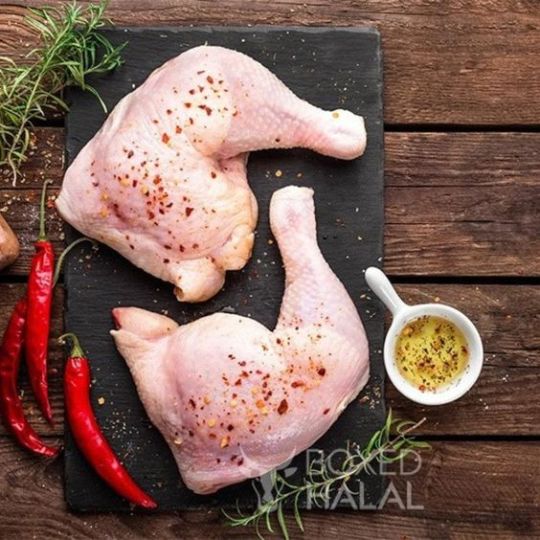
The local halal food store is a store that offers food items that are allowed by Islamic law. A wide range of products, including meat, dairy, snacks, drinks, spices, and more, are available at the halal store near me. We guarantee that all its items are handled and put together in compliance with halal standards and acquired from approved halal suppliers. Delivering fresh, inexpensive, and high-quality local halal food options to our clients is the goal of our local halal food store. In addition to locations in various US cities, our local halal store also acts as an online store where clients can place orders and get their goods. For more details, check out the following.
Local Halal Store
Phone: 0-800-12-345-6 880
Address: 27 E Central AVE, Paoli, PA 19301, USA
Mail: [email protected]
Website: https://localhalalstore.com/
#halal locations#local halal grocery#local halal#local halal meat#local halal food near me#Halal store near me#Local halal food#Local halal seafood#local halal chicken#grocery halal store near me#local halal restaurants near me#local halal places#local halal restaurants#halal meat near me delivery#halal supermarket near me#local delivery halal food#halal restaurants near me halal#halal kitchen near me#halal international near me
0 notes
Note
one of my fav things that nobody talks about are the restaurants, usually family owned and not really name brand or a ‘big’ company, that give you your moneys worth in food 😭��� spent $60 at this halal place and they gave me a chicken shawarma wrap so big and thick i didn’t finish it until the next day

locally owned restaurants >>>
9 notes
·
View notes
Text
Overstimulated-potato-gem's holiday review: Thailand. Phuket Specifically.
One word: Beautiful.
Food: Easy to find Vegetarian, Halal, Vegan, Lactose Free, Gluten Free, be careful about food with nuts, seems to be very common.
Positive experiences: Warm weather, kind and caring locals, very friendly atmosphere, beautiful surroundings, lots of food options for everyone (i.e; Vegetarian, Vegan, Gluten Free, Lactose Free), laid-back attitudes, lots of recreational activities (swimming, hiking, water sports), inexpensive.
Negative experiences: Sometimes getting peer pressured into buying things, crossing roads and driving feels unsafe, some places are unsanitary, paying for toilets.
Overstimulation: Loud Noises, Humidity, Sand, Strange Smells, Sticking feeling, Sometimes Overcrowded, Small Spaces, Motion Sickness.
Recommended Activities: Bathing with Elephants, Snorkeling at Freedom Beach, Boat tours of Phi Phi Island and James Bond Island, Enjoying different restaurants.
🍃 Legal





#travelingwithautism#just autism things#thailand#phuket#recommendations#travellingwithme#🍃#overseas#overstimulated#asian countries
4 notes
·
View notes
Text

May the luck of the Irish be with you as St. Patrick’s Day arrives next Monday! St. Patrick's Day was originally observed in Ireland with religious services and feasts in honor of the country’s patron saint. When Irish immigrants brought their traditions to the United States, the day evolved into a secular celebration of the Emerald Isle’s culture, people and heritage marked by parades, music, dancing, green attire, and a host of special Irish food and drinks.
Whatever your plans for this fun and festive holiday weekend, your Down to Earth farmers market will have an array of locally grown, sourced and produced goodies to make your St. Paddy’s Day spread as green, jolly and delicious as can be!
Irish Breakfast What better way to kick off your celebrations than a traditional Irish breakfast? This tasty meal likely evolved from its close counterpart, the full English breakfast, that became popular during the Victorian era with farm laborers needing substantial and energy-rich sustenance to fuel their grueling day’s work. The hearty fare typically features bacon, eggs, sausage, grilled tomatoes, mushrooms, fried potatoes, and black and white pudding served with a side of soda bread or brown bread for soaking up the juices. The full Irish breakfast is a symbol of Irish hospitality and considered a great way to start the day on a strong note.

Your St. Paddy’s Day classic Irish breakfast will have extra appeal when this recipe is made with pasture-raised eggs, grass-fed meat and fresh, local veggies from the farmers market:
Ingredients for 2 servings:
3 tablespoons vegetable oil
2 Goode & Local by Don Rodrigo Mangalitsa pork sausages
4 rashers Goode & Local by Don Rodrigo hickory-smoked bacon
1 large Jersey Farm Produce hothouse tomato
1 cup Mushrooms.NYC King Oyster mushrooms, sliced
1 tablespoon Maplebrook Farm butter
2 potato cakes made with Halal Pastures Farm potatoes
Wave Hill Breads brown bread, for toast
Kosher salt
Black pepper
Irish Stew The first Irish stew recipe dates to the 1600s when this simple, rustic preparation was made with just mutton, potatoes, and onions by shepherds and rural farmers who could access only a few ingredients but needed a hearty and nourishing meal. While it has evolved and adapted over time to include a variety of ingredients and cooking methods like in this recipe, it remains a classic dish to serve on St. Patrick’s Day or anytime you’re craving warming winter comfort food.
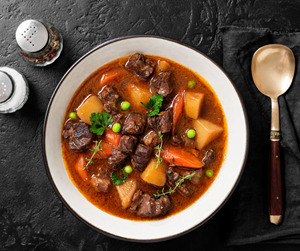
Irish Pies Pies have long been a part of Irish culinary tradition as a way to celebrate the bounty of the land while using up leftover ingredients, making them a practical and economical option. Noble Pies has a full menu of festive St. Paddy's Day-themed pies and traditional Irish goodies to make your life as easy as pie this weekend! Place your pre-order on their website for these delectable sweet and savory options:
Corned Beef & Cabbage
Onion & Leek Quiche
Sweet Leprechaun Pie
Green Key Lime Cream Pie
Green Chocolate Cream Pie
Irish Oatmeal Scones
Chocolate Guinness Cake
Irish Soda Bread
Irish Coffee The Irish Coffee was born on a dark and stormy winter’s night in 1942 at Foynes Airbase on the wild west coast of Ireland. At that time, the airbase was a key refueling depot and stop-off for civilian air travel between Europe and the Americas, often welcoming Hollywood celebrities and other high-profile passengers. An airport restaurant was created to cater for these dignitaries who were often midway through their long journeys and in need of refreshments.

That famous night a passenger plane destined for New York was forced to return to Foynes due to severe weather over the Atlantic before making another flight attempt the next day. Upon hearing of the aircraft’s imminent return, head chef and bartender Joe Sheridan hastily prepared coffees mixed with brown sugar, Irish whiskey and cream to revive and comfort the cold and weary passengers. After sipping on the warming elixir, one of the passengers piped up and asked, “Are these Brazilian coffees?” to which Sheridan replied “No, they’re Irish coffees!”. And thus, the legend of Irish Coffee was born.
Add some pep to your step this St. Patrick’s Day with this classic Irish coffee recipe featuring the bold flavor of Cano Coffee Company’s dark roast to offset and complement a shot of strong Irish whiskey. Cano Coffee Company’s beans are grown on small, family-owned microlots in the high mountains of El Huila, Colombia and roasted in New York. Their beans are handpicked at the fully developed stage by experienced cafeteros, then spring water washed and sundried to perfection.
Ingredients
1 cup hot, black, freshly brewed Cano Coffee Company Midtown Rush Dark
2 teaspoons brown sugar
1 shot Irish whiskey of your choosing
Double cream
Directions
Heat a tall, traditional Irish coffee glass with boiling water.
Pour away the water, add the brown sugar and coffee and stir until the sugar has completely dissolved.
Add a shot of whiskey to the coffee and stir slowly to mix.
Using a jug with a thin spout, pour cream slowly over the back of a warm spoon onto the coffee without breaking the surface until you reach the rim of the glass.
While you’re busy enjoying these classic Irish delights, we hope you find your lucky four-leafed clover and pot-o-gold at the end of the rainbow this St. Patrick’s Day weekend! We look forward to seeing you in the farmers market.
#downtoearthmkts#farmersmarket#eatlocal#shoplocal#buylocal#farmersmarkets#localfood#eatdowntoearth#local food#st. patrick's day#st patrick's day#st paddy's day#st pattys day
2 notes
·
View notes
Note
we do have actual restaraunts and by and large theyre run by immigrants who came here and opened a restraunt. that doesnt matter though i'm here to complain about MILD, MEDIUM, AND HOT SPICE LEVELS. at the indian place in my hometown (excellent restraunt) this is a REASONABLE SCALE. it MEANS SOMETHING. at the taco place where i go to college, and also at aldi's when i buy salsa, it apparently means NOTHING. mild salsa is NOTHING. medium salsa is SPICELESS??? there is allegedly some spice in there or it wouldn't be called medium but i have yet to find it. and hot is i guess your only hope for any spice flavor at all so better hope hot is edible to you! whereas at my beloved indian restraunt mild is a bit spicy (you can taste the spice), medium is quite spicy (this is what my mom and i get), and hot is presumably india-hot but i don't know bc we stick with medium. apparently my beloved indian place is not the norm and this appalls me.
anyway. american restraunts, if they're not fast food chains (and while there are differences it's not meaningful enough to matter; mcdonalds fries are like skinnier or whatever idfc) and they're not an ethnic cuisine which usually only shows up in towns/cities big enough to support them (and therefore less common in areas that are less likely to be interested or trusting of foreign food), and they're not the occasional local american food place (like grill or whatever, but those are also usually chains like texas roadhouse or chilli's - we really don't tend to have american food restraunts. like there's one in my hometown but they're literally famous for Existing and have a cookbook even though theyre not that good) are like. diners. diners are the only non-chain american food place that i feel like consistently can be found in most places. and that's a diner. it serves diner food. and more steaks and hamburgers
shoutout to every single halal cart i've ever eaten at also. bangers forever
nodding thoughtfully. see if americans were diehard burger samurai over their local diners it'd make more sense to me. like that's respectable. i'd also be a burger smaurai if i lived near a cool diner
81 notes
·
View notes